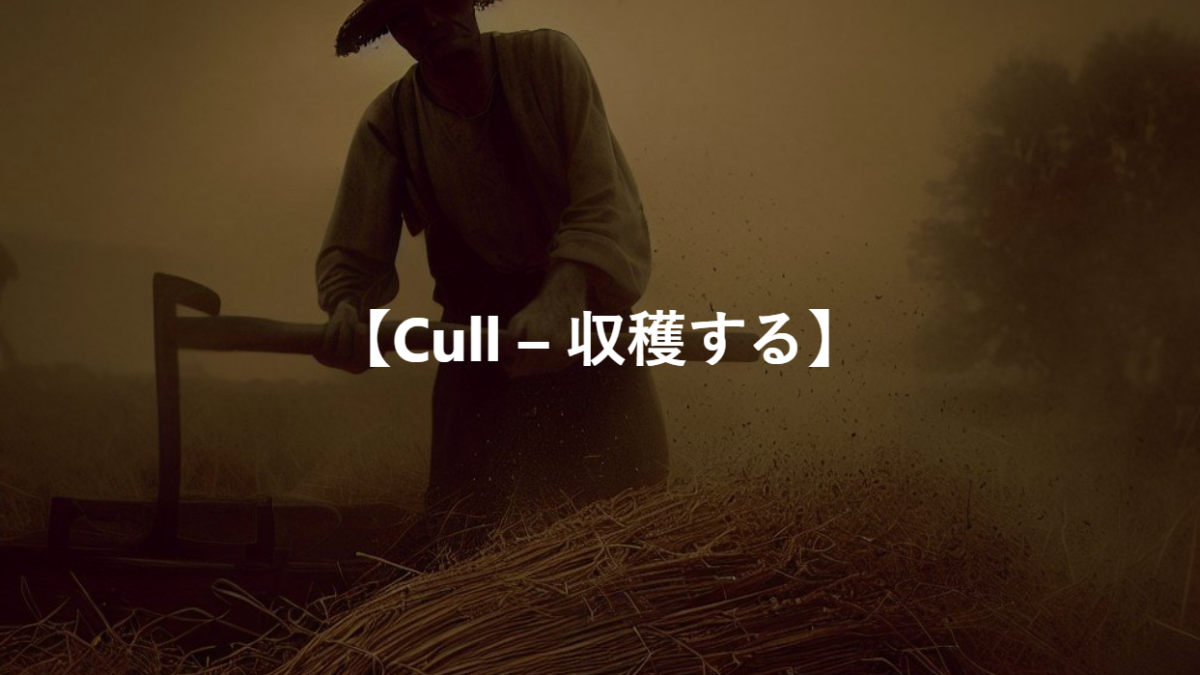語源・類義語・反対語・例文
【Cull – 収穫する】という単語の語源とか由来を知っていますか?
「Cull」の語源は、主に「選ぶ」や「選択する」という意味を持つ中英語の「cullen」や古フランス語の「cuillir」から来ています。これらはさらに、ラテン語の「colligere」(「com-」(一緒に)+「legere」(選ぶ))に由来し、そこから「収集する」や「摘む」という意味が派生しました。時代が進むにつれて、「Cull」は特定の基準や目的のために個体や物を選び出す、つまり「選別する」や「除去する」という意味で使われるようになりました。
現代英語において、「Cull」は農業や動物管理の文脈でよく用いられ、品質向上や管理を目的として特定の個体を選び出して取り除く行為を指します。また、広義では情報やデータを選び出す際にも使用されることがあります。この単語は、選択のプロセスが含意される場面でしばしば見られるため、単に収穫する以上のニュアンスを持っています。
The origin of the word “Cull” primarily comes from the Middle English “cullen” or Old French “cuillir,” which means to choose or select. These, in turn, derive from the Latin “colligere” (composed of “com-” meaning together and “legere” meaning to choose), from which the meanings to gather or to pick have evolved. Over time, “Cull” has come to be used to denote the act of selecting individuals or items based on specific criteria or for a particular purpose, essentially meaning to sort or to remove.
In contemporary English, “Cull” is frequently employed in the contexts of agriculture or animal management, referring to the act of selecting and removing certain individuals for the purpose of improving quality or management. Moreover, in a broader sense, it is also used when selecting information or data. Since the word often implies the process of selection, it carries nuances beyond merely harvesting.
この単語の類義語・反対語を教えてください。
類義語
- Select – 選択する。特定の基準に基づいて選び出す行為。
- Harvest – 収穫する。農作物を収集する行為、またはその時期。
- Gather – 集める。複数のアイテムや情報を一箇所に集めること。
- Pick – 摘む。特定の物を選んで取る行為。
- Sort – 分類する。類似の特徴を持つアイテムをグループに分けること。
反対語
- Disperse – 分散させる。アイテムや個体を広範囲に散らばらせること。
- Scatter – 散布する。物をランダムにまたは広範囲に広げること。
- Accumulate – 蓄積する。時間の経過と共に物や情報が徐々に増加すること。
- Ignore – 無視する。意図的に注意を払わない、または選択から外す行為。
- Neglect – 放置する。適切な注意や手入れをせずに放っておくこと。
似た単語で間違いやすい単語はありますか?
- Cull:
- 「Cull」は、特定の基準に基づき、植物や動物などの中から選び出し、不要なものを除去する行為を指します。農業では、品質管理のために劣った作物を取り除く意味で使われることが多いです。また、一般的には情報やデータを選別する際にも使用されます。
- Cultivate:
- 「Cultivate」は、土地を耕し、植物を植えて成長させる過程全体を指します。これには、種まき、水やり、肥料の施用など、植物を健康に育てるために必要な一連の行動が含まれます。
- Harvest:
- 「Harvest」は、作物が成熟した後にそれを収集する行為を指します。これは成長のサイクルの終わりに行われ、食用、販売、または他の目的のために作物を収穫することを意味します。
この単語にまつわるエピソードなどはありますか?
「Cull」にまつわる興味深いエピソードとしては、イギリスの歴史における「Cullodenの戦い」という事件があります。
1746年、スコットランド北部のカラドン(Culloden)において、ジャコバイト軍とイギリス政府軍が対峙しました。ジャコバイト軍はチャールズ・エドワード・ステュアート率いるスコットランドの反政府勢力であり、イギリス王位を目指して反乱を起こしていました。
Cullodenの戦いは、ジャコバイト軍が壊滅的な敗北を喫した戦いとして知られています。イギリス政府軍の近代的な戦術と装備がジャコバイト軍の伝統的な高地兵との戦闘で優位に立ち、わずかな時間でジャコバイト軍を打ち破りました。
この戦いにおいて、イギリス政府軍はジャコバイト軍の生存者を選別し、処刑や捕虜にする行為を行ったとされています。これは「Cull」という言葉が「選別する」という意味を持つことから、この戦いの名前が「Cullodenの戦い」と呼ばれるようになった理由の一つとされています。
Cullodenの戦いはスコットランドの歴史において重要な出来事であり、ジャコバイト軍の敗北がスコットランドの伝統的な文化や政治への影響をもたらしました。そのため、「Cullodenの戦い」という言葉はスコットランドの歴史と文化において重要な位置を占めています。
An interesting episode related to “Cull” is the event known as the “Battle of Culloden” in British history.
In 1746, in Culloden, a region in the north of Scotland, the Jacobite forces confronted the British government army. The Jacobite army, led by Charles Edward Stuart, was a Scottish anti-government force aiming for the British throne and had initiated a rebellion.
The Battle of Culloden is known as a devastating defeat for the Jacobite forces. The British government army’s modern tactics and equipment held superiority over the Jacobites’ traditional Highland warriors, and the Jacobite forces were quickly overpowered in a short period.
In this battle, it is said that the British government army culled the survivors of the Jacobite forces, executing or taking them as prisoners. This act of selection and removal is one of the reasons why this battle is referred to as the “Battle of Culloden,” given the word “Cull” means to select or sort out.
The Battle of Culloden is a significant event in Scottish history, with the defeat of the Jacobite forces having an impact on Scotland’s traditional culture and politics. Therefore, the term “Battle of Culloden” holds an important place in Scottish history and culture.
この単語を使った例文をいくつか教えてください。
The farmer decided to cull the weakest chickens from the flock to ensure the overall health and productivity of the remaining birds.
(農夫は群れから最も弱い鶏を選び出し、残りの鳥の健康と生産性を確保することにしました。)
The company had to cull a few underperforming employees in order to streamline its operations and improve efficiency.
(会社は業務を合理化し、効率を改善するためにいく人の業績が低い従業員を削減せざるを得ませんでした。)
The wildlife management team decided to cull a portion of the deer population to prevent overgrazing and maintain a healthy balance in the ecosystem.
(野生生物管理チームは、過度の過放牧を防ぎ、生態系の健全なバランスを保つために、一部の鹿の個体数を削減することに決定しました。)
The chef carefully culled the fresh herbs from the garden, selecting only the finest ones to enhance the flavors of the dish.
(シェフは庭の新鮮なハーブを慎重に選び、料理の風味を引き立てるために最上のものだけを選びました。)
In order to maintain a high-quality wine, the winemaker decided to cull a certain percentage of grapes that did not meet the desired standards.
(上質なワインを維持するために、ワインメーカーは基準に適さない一定割合のブドウを削減することにしました。)
【Cull – 収穫する】のコロケーション
- Cull the herd – 群れから選別する
- 畜産業において、健康でない、または品質基準を満たさない動物を群れから取り除く行為を指します。これにより、全体の品質が向上します。
- Cull inferior fruits – 劣った果物を選別する
- 品質が低い、または病気にかかっている果物を収穫時に選び出して取り除く行為。これは、残りの果物がより良い成長環境を得られるようにするためです。
- Cull information – 情報を選別する
- 大量の情報から重要または関連性の高いものを選び出すプロセス。この場合の「Cull」は比喩的な使い方となりますが、選択的な収集の概念を表しています。
- Cull based on criteria – 基準に基づいて選別する
- 特定の基準や条件に基づいて、作物やデータ、情報などを選び出す行為。これにより、最終的な品質や効率が向上します。
「Cull」という言葉は、「選び出す」「選別する」という意味で広く使用されています。一般的には、不要なものを取り除くことや特定の基準に基づいて選択する行為を指します。この用語は農業、畜産業、または情報管理など、さまざまな分野で適用されることがあります。
たとえば、「Cull the herd」(群れから選別する)は、畜産業において品質や健康が劣る動物を群れから除外するプラクティスを指します。これは、全体としての群れの健康や品質を向上させることを目的としています。
また、「Cull inferior fruits」(劣った果物を選別する)は、収穫する際に品質が低い果物を選び出して除去することを意味します。これにより、残った果物がより良い条件下で成長し、全体の収穫量の質が向上します。
「Cull information」(情報を選別する)は、大量の情報の中から特に重要または関連性の高い情報を選び出すプロセスを指します。この場合、「Cull」は比喩的に使われ、選択的な収集やフィルタリングの概念を示しています。
「Cull based on criteria」(基準に基づいて選別する)は、作物、データ、情報などを、特定の基準や条件に従って選び出す行為を表します。これにより、効率性や最終的な製品の品質が向上することが期待されます。
これらのコロケーションを通じて、「Cull」がどのようにして特定の状況で選択的な除去や選別が行われるかを示しています。それぞれの文脈で、「Cull」は最適な結果を得るために重要なプロセスとなっています。
The word “Cull” is widely used to mean “to select” or “to sort,” typically referring to the act of removing unwanted items or choosing based on specific criteria. This term can be applied in various fields, such as agriculture, animal husbandry, or information management.
For instance, “Cull the herd” refers to the practice in animal husbandry of excluding animals that are inferior in quality or health from the herd. This aims to improve the overall health and quality of the group.
Similarly, “Cull inferior fruits” denotes the act of selecting and removing lower quality fruits during harvest. This ensures that the remaining fruits grow under better conditions, improving the quality of the overall yield.
“Cull information” points to the process of selecting particularly important or relevant information from a large amount of data. Here, “Cull” is used metaphorically to represent the concept of selective gathering or filtering.
“Cull based on criteria” describes the act of selecting crops, data, or information according to specific standards or conditions. This is expected to enhance efficiency and the quality of the final product.
Through these collocations, we see how “Cull” indicates the process of selective removal or sorting in specific situations. In each context, “Cull” becomes a crucial process for achieving optimal outcomes.
cullを使った文法問題
- The farmers _____ the ripe tomatoes from the field.
- (A) cull
- (B) culls
- (C) culled
- (D) are culling
解答と解説: (C) culled
解説: 農家がトマトを収穫したのは過去の出来事なので、過去形のculledが適切です。
- The zookeepers had to _____ the deer population to prevent overgrazing.
- (A) cull
- (B) culls
- (C) culled
- (D) are culling
解答と解説: (A) cull
解説: had to の後なので動詞の原形であるcullが適切です。
- The editor _____ the best articles for the magazine from a large number of submissions.
- (A) cull
- (B) culls
- (C) culled
- (D) are culling
解答と解説: (C) culled
解説: 編集者が記事を選んだのは過去の出来事なので、過去形のculledが適切です。
- The company decided to _____ underperforming employees to improve overall productivity.
- (A) cull
- (B) culls
- (C) culled
- (D) are culling
解答と解説: (A) cull
解説: decided to の後なので動詞の原形であるcullが適切です。
- The wildlife officials are _____ the herd to maintain a healthy balance in the ecosystem.
- (A) cull
- (B) culls
- (C) culled
- (D) are culling
解答と解説: (D) are culling
解説: 野生動物担当官が群れを間引いているのは現在の行動なので、現在進行形であるare cullingが適切です。

